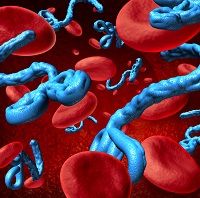Article
CDC: "No Way to Get Ebola Risk to Zero"
Author(s):
As concern mounts about the possibility of Ebola spreading throughout the US, hospitals are increasingly vigilant. At a news briefing Oct.13, CDC director Thomas Frieden, MD, said the agency has not changed its mind about not restricting travel to and from West Africa, and is focused on tightening infection control measures to "break the chain of infection." The CDC still has not learned how a nurse who cared for Dallas, TX, Ebola victim Thomas Eric Duncan got infected, but perhaps it was her gloves, Frieden suggested. Testing takes time, doctors elsewhere report.

As concern mounts about the possibility of Ebola spreading throughout the US, hospitals are increasingly vigilant. Addressing those concerns at a news briefing Oct.13, CDC director Thomas Frieden, MD, said the agency has not changed its mind about refusing to restrict commercial travel to and from West Africa, and is focused on tightening infection control measures to “break the chain of infection.” That does not include designating special hospitals as Ebola treatment centers, he said.
The epidemic has spread in Dallas to a second patient, raising concerns about others who had similar exposures. On Oct. 12 the CDC reported that a Dallas, TX, nurse at Texas Presbyterian Health who cared for patient Thomas Eric Duncan, the Ebola patient who died Oct. 8, had also been diagnosed with the illness. At the CDC briefing Frieden said there is still no certainty about how that nurse got infected. None of the other caregivers or others known to have had contact with Duncan have become ill, Frieden said.
“We have not found a specific problem that led to infection,” Frieden said, adding that one possibility is the practice of wearing multiple sets of protective gloves. “Additional sets of gloves could make it less safe because it is more difficult to remove layers,” he said. The CDC is evaluating protective clothing, looking for items that may be easier to put on and remove, he said.
Asked whether the US should set up designated Ebola-treatment hospitals, Frieden said it made more sense for all hospitals to be prepared and their staffs trained to handle the illness.
That is a matter of “meticulous attention to detail, “ Frieden said.
He added that hospitals might want to have “buddy systems” where workers observe each other donning and removing protective gear to make sure the process is done correctly.
He reiterated that the CDC is not planning to recommend that travel to and from West Africa be banned or restricted.
“We recognize that there is no way to get the risk in the US to zero,” Frieden said. The focus is on breaking the chain of infection.
Elsewhere, doctors involved in monitoring patients for possible infections said that can be a slow process. Doctors have to wait for symptoms to appear, which can take days after exposure, said Ambreen Khalil, MD, an infectious disease specialist at Staten Island University Hospital.
Not until then can they do an ELISA test to check for antigens, followed by an IgM test for antibodies, then an IgG test if those results are positive. Preliminary testing can be done locally but then patients’ blood samples must be sent to the US Centers for Disease Control and Prevention,” she said.
That process means packing the blood sample in a special container and sending it overnight using an approved carrier.
“The test itself takes hours, but getting the specimen there takes time,” Khalil said.
So far her hospital sent specimens to the CDC twice, both cases in patients who had arrived from Nigeria and had developed aches and fevers.
“It turned out to be malaria—malaria has the exact same symptoms as Ebola in the early stages,” she said.





